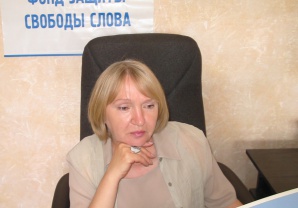
Tanya Burdett: The public should be involved in decision-making
15/01/2014
Criminal Liability for Libel and Insult Hinders Battle Against Corruption
04/03/2014
These restrictions are defined quite broadly. But for them to be interpreted neither arbitrarily, nor extensively, the world’s leading experts – the United Nations Special Rapporteur of the Right to Freedom of Opinion and Expression, the OSCE Representative on Freedom of the Media and the Organization of American States’ (OAS) Special Rapporteur on Freedom of Expression – have issued a number of documents, which explain the limits of restrictions on freedom of expression.
In particular, the Joint Declaration of the Representatives of Intergovernmental Bodies to Protect Free Media and Expression states, “Criminal defamation is not a justifiable restriction on freedom of expression; all criminal defamation laws should be abolished and replaced, where necessary, with appropriate civil defamation laws.”
The UN Special Rapporteur on Freedom of Opinion and Expression in his 2008 Report emphasized that, “the subjective character of many defamation laws, their overly broad scope, and their application within criminal law have turned them into powerful mechanisms to stifle investigative journalism and silent criticism.”
General Comment No. 34, issued by the UN Human Rights Committee in 2011, (Kazakhstan has been appointed to that Committee in 2013) states, “the Committee expresses concern regarding laws on such matters as, lese majesty, desacato, disrespect for authority, disrespect for flags and symbols, defamation of the head of state and the protection of the honuor of public officials, and laws should not provide for more severe penalties solely on the basis of the identity of the person that may have been impugned.”
While the drafters of the new Criminal Code are familiar with Article 19 of the International Covenant on Civil and Political Rights, they seem not to be aware of the international standards of restrictions on freedom of speech, set by the third provision of the Covenant. This may have resulted in excessive restrictions, introduced in the draft of the Criminal Code.
When the Criminal Code was in the process of drafting, our coalition “20 BAP”, [1] consisting of 12 NGOs, sent to the General Prosecutor’s Office its suggestions substantiating arguments for decriminalization of defamation. We received a response, signed by the Interdepartmental Working Group, stating, “In our opinion, the decriminalization of libel and slander will not promote freedom of expression but increase malicious attacks on citizens’ honor and dignity. This does not comply with the provision of the International Covenant on Civil and Political Rights to respect the rights and reputations of others while exercising the right to freedom of expression.”
I have already mentioned an issue of the misinterpretation of the third provision of Article 19. As for “malicious attacks,” according to the Legal Statistics and Special Accounts Committee of the General Prosecutor‘s Office, in Kazakhstan, from 2010 to June 2013, a total of 1,480 defamation cases were terminated, including 760 cases, which were settled out of court. According to Adil Soz Foundation’s data, between 2001 and 2013, 65 defamation lawsuits against journalists were taken to court. In 16 instances, the court found the defendant guilty, resulting in the imprisonment of three. Whether these are socially dangerous acts per se is yet a question to ponder. Furthermore, I believe, it is crucial to decide if it is rational to overload criminal courts with hundreds of domestic quarrels.
Lastly, one of the decisive arguments for retaining criminal liability for defamation the drafters cite a legal practice, enacted in the European Union. Recently, Mr. Iogan Merkel, [First Deputy Prosecutor General], again, stated that 27 E.U. countries still maintain criminal liability for defamation. ‘When the EU countries first abolish [it], we will see what it entails,’ he said. In the meantime, he overlooks the fact that Germany, for instance, has not prosecuted anyone with criminal defamation in over 50 years. These countries fall under the jurisdiction of the European Court of Human Rights, which is fundamentally opposed to criminal defamation. And Russia, though, mentioned as having re-introduced criminal defamation, in fact, has removed imprisonment as a form of punishment.
No one wants to be defamed. Personal reputation is at highly valuable. Public officials fall under a greater risk of unsubstantiated accusations. Our civil statutes, however, provide ample possibilities to protect individuals’ honor and dignity. Furthermore, it is crucial to remember that the 1946 UN General Assembly resolution No. 59 (I) states, “Freedom of information is […] the touchstone of all the freedoms.”
I hope that parliamentarians will provide a fair assessment of the drafters’ competencies in the area of freedom of expression and will take into account recommendations of the civil society.
Tamara Kaleyeva,
President of Adil Soz, International Foundation for Protection of Freedom of Speech
[1] The Coalition borrows its name from Article 20 of the Constitution, which promotes freedom of expression

